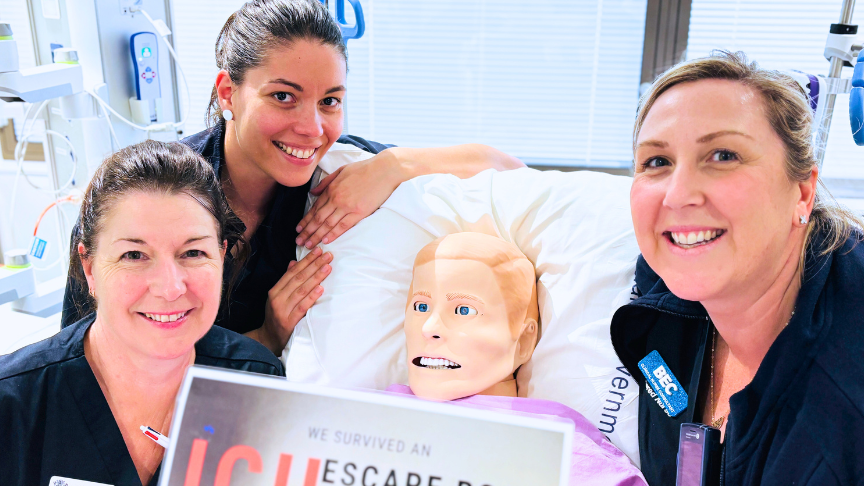What’s happening?
As Redland Hospital’s new Intensive Care Unit prepares to open later this year, staff have been trialling an unusual but effective training method. Using a high-tech mannequin named “Handsome George” and escape room-style simulations, teams are put through high-stakes clinical scenarios such as anaphylaxis, requiring them to work step by step to “escape”.
Why it matters
ICU Nurse Educator Ebony Lawrie said the training had been a hit with staff. “It might sound unusual but escape room simulations are a fantastic way to build team culture,” she said. “Handsome George can scream, cough, make lung sounds such as wheezing and simulate an airway obstruction. We can also drop his heart rate, change his blood pressure and even dilate his pupils. Teams have to work together under pressure, communicate clearly, and you can’t skip a step or cut corners.”
Ebony said the simulations also improved stress management and resilience. The escape room set-up recreated the time pressure and cognitive load of real clinical crises in a safe space. “It’s a fun way to learn, but also a really powerful way to reinforce hospital protocols in a safe space.”
Local impact
The training builds stronger, more resilient teams ahead of the ICU’s opening later this year. It prepares hospital staff to handle critical moments with greater teamwork and focus.
By the numbers
-
Redland Hospital’s new ICU is opening later this year.
-
Handsome George can simulate symptoms including wheezing, airway obstruction, and dilated pupils.
-
Bayside Executive Leadership Team members, including Executive Director Greg Nolan, have already completed the anaphylaxis escape room challenge.
Zoom in
The escape room model gives staff a safe but intense environment to practice teamwork. Ebony Lawrie highlighted how each scenario demanded clear communication and precision, ensuring protocols were followed correctly under pressure.
Zoom out
The Bayside Executive Leadership Team also tested the training. Executive Director Greg Nolan described the experience as eye-opening. “It was great fun, but also a serious reminder of how complex clinical teamwork can be,” he said. “The simulation really brought home the importance of clear communication. That if you miss something, the whole team feels it. It’s exactly the type of training that will help build a strong, focused and high-performing team when we open the ICU later this year.”
What to look for next
Redland Hospital will open its new ICU later this year, with staff training continuing to focus on building strong, high-performing clinical teams.



